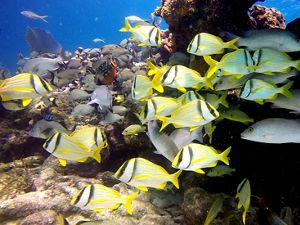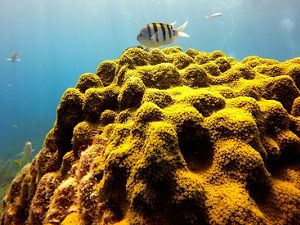Promoting Sustainable Snapper and Grouper Fisheries
We’re working with recreational fishermen to achieve healthy and sustainable snapper and grouper populations.
Healthy oceans depend on healthy fisheries, and fisheries need healthy oceans to thrive. When an important species is overfished, it doesn't just affect the ability of that fish population to reproduce; it can throw the entire ecosystem off balance. Along the east coast of the United States, the health of the menhaden (pogy, bunker) population can have far-reaching impacts on the health of the ocean and availability of popular fish species along the coast from Maine to Florida, in addition to the health and populations of whales, dolphin and osprey that feed on menhaden. And overfishing of algae-grazing parrotfish in the Caribbean has led algae to proliferate and damage coral reefs, which are essential to healthy fish populations.
It comes down to the food web, or the complex connections between the plants and animals that provide food for each other in the ocean. In this system, biodiversity loss can cause a domino effect across the whole community.
What Are Sustainable Fisheries?
In a sustainable fishery, fish species are being harvested in a way that allows the population to reproduce and replenish itself. This isn't just better for the environment, it also benefits people. When fish populations are stable, it means both recreational fishermen and the commercial fishing industry can continue to make a living, people can have enough to eat, while ensuring the number of fish needed to guarantee future ocean health.
Fisheries management describes the mix of rules and fishing practices used to protect fish stocks and prevent them from being harvested in an unsustainable way. Good management can include regulations that explain to anglers where they can fish and what types of tackle they can use, monitoring and data collection to give scientists a better idea of whether fish populations are being depleted, and fishing seasons that offer a clear window in which they can sustainably harvest certain species.
Managing fisheries to be more sustainable is one of the most effective tools that we have to influence both the immediate and longterm health of our oceans. That’s why TNC is launching a new program to support a healthy snapper and grouper fishery in Florida.
TNC has been involved in sustainable fisheries in other parts of the United States and around the world for many years, including working with fishermen off the Oregon coast to modernize data collection and improve monitoring, and testing new methods to reduce bycatch in the longline tuna fishery in the Pacific island nation of Palau.

The Impact of Recreational Fishing in Florida
In Florida, recreational anglers represent a larger share of the overall user group than in other parts of the world. Recreational fishing in Florida generates an estimated $6 billion in annual expenditures, compared with $15 million for all other South Atlantic states combined. Of the many fish harvested in these waters, the National Oceanic and Atmospheric Administration (NOAA) scientists have identified snapper and grouper as being the most vulnerable to overfishing. This large complex of fish, comprising more than 50 species in Florida waters, is the most diverse complex in the region, and is of vital importance to the coastal ecosystem.
These long-lived species are often associated with hard-bottom habitats, meaning both shallow and deep-water coral reefs, where they serve an important role as predators, keeping populations of smaller fish in check. They're also important to the state’s economy, as a prime target fish for recreational anglers.
Recreational anglers have the ability to influence and impact snapper and grouper fishery management, just as they do all other fisheries they are engaged in.
In the longterm, our goal is to achieve snapper and grouper stocks that are healthy, sustainable, and serve their important role in the ecosystem by 2045. Getting these fish populations back on track will be an important step to restoring the health and function of coral reefs in Florida, preserving the rich biodiversity of the region's waters, and making sure that these ecosystems are protected for the future. In addition to benefitting the environment, a healthy fin fishery provides economic benefits for the recreational fishing industry and keeps these important food fish on our plates for years to come.
As a first step, we’re launching a two-year project to gather data and reduce mortality of discarded fish by promoting the use of fish descending devices.
If you catch a fish that is either out of season or undersized, you have a responsibility to return it to the water alive. This is one example of the common-sense regulations that are a key tool in giving popular species a chance to recover and replenish themselves.

The Problem of Barotrauma
One of the major issues affecting snapper and grouper species is barotrauma, or injuries caused by a rapid change in pressure. Just as divers get the bends if they surface too quickly, when a fish is pulled up from deep water, the compressed gas in its body expands. This change can cause its eyes to bulge, its stomach to pop out of its mouth, and bubbles to form in its heart and brain. If the fish doesn’t die from these injuries after being released, the extra gas in its body will cause it to float like a cork, making it vulnerable to predators and unable to swim down to a safe depth. In some species, mortality rates can be as high as 70 percent.
Introducing the "Deck to Depth" Program
The Deck to Depth program will drive collaboration with recreational anglers, captains, and other stakeholders across the Sunshine State to promote proper release practices and better data collection. It supports the 55 species of snapper and grouper that are of vital importance to Florida’s coastal ecosystems and recreational anglers. These species are challenged by overfishing, and are at great risk of barotrauma if not released properly by anglers.
A Safer Way to Release Fish
Fish descending devices offer a way to help prevent barotrauma. These simple tools use various techniques to quickly pull the fish back down to the proper depth and release it. Some clip onto the fish’s mouth and use an automated mechanism to release at a predetermined depth. Others latch onto the mouth with a blunt hook, or trap the fish in a container, and are released manually with a quick jerk of the line.
Whichever version the angler uses, descending devices significantly reduce discard mortality rates. Even if a fish has visible injuries from barotrauma, those injuries can be reversed, and the fish can safely swim away if it’s handled properly and returned to the ocean quickly. These devices are also much safer and more effective than venting the fish by puncturing its swim bladder, a common practice to reduce mortality.
Used correctly, descending devices can help fish survive, reproduce and help grow a healthy population for future generations of anglers to enjoy.
Help Us
If you are a recreational angler who is interested in helping us with our fisheries work, please connect with David Moss, Florida fisheries manager at david.moss@tnc.org.
Partnering with the Fishing Community
Florida is considered the recreational fishing capital of the United States, with the highest level of recreational fishing activity in the country. It's also one of the only states with a significant snapper and grouper population and fishery within state waters.
Helping specific fish
species recover can ultimately result in less regulation, longer fishing
seasons, and more fish in the ocean. This is why TNC is working with
recreational anglers to raise awareness about fish descending devices
and how to use them.
Quote: David Moss
The most important thing is to get the fish off the deck and back down to depth as quickly as possible. Using a descending device significantly improves the chances of survival.
Closing the Data Gap
In addition to improving the overall health of snapper and grouper species in our waters, a second major goal of our fisheries program is to assist in gathering data. Right now, effective management of these fisheries is hindered by a lack of reliable data. Without accurate and timely data, scientists can only make their best guess about how many people are fishing for snapper and grouper, how many fish they are catching and releasing, how many of these fish survive and what other natural factors influence the health of the two species.
In an effort to increase access to accurate information, TNC will be collecting data regarding overall awareness of descending devices among recreational anglers, whether and how they are being used, and prevalent catch-and-release practices. This data will help give scientists and management agencies a better idea of how many fish are being caught and released, leading to more effective, science-based management and a better chance of helping fisheries become sustainable.
Angler to Angler
Florida’s fishermen care about the snapper and grouper fisheries and understand their value, which is why we’re partnering with boat captains, social media influencers and other leaders in the recreational fishing community to help spread the word about the importance of descending devices, and to educate anglers on the benefits of proper handling technique.
Quote: David Moss

“As a recreational angler, I understand why the recreational fishing community is such an integral part of this process. They can help reduce fish mortality rates and increase their numbers. We can’t achieve our goal without them.
The only way to succeed in this endeavor is for the entire fishing community to work together toward a common goal. By educating others, using descending devices and helping to collect data, we can decrease mortality rates, help restore snapper and grouper stocks in Florida, ensure there’s enough fish to maintain a healthy ecosystem and support a robust recreational and commercial fishing industry for years to come.




KipEvansMissionBlueAG4V9634_1640x1230.jpg?crop=0%2C0%2C1640%2C1230&wid=300&hei=225&scl=5.466666666666667)